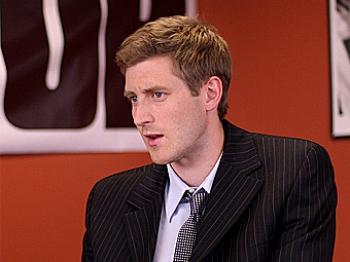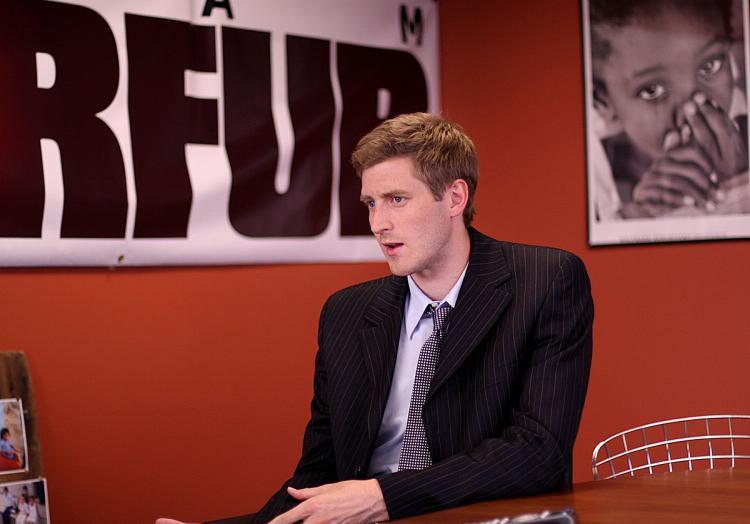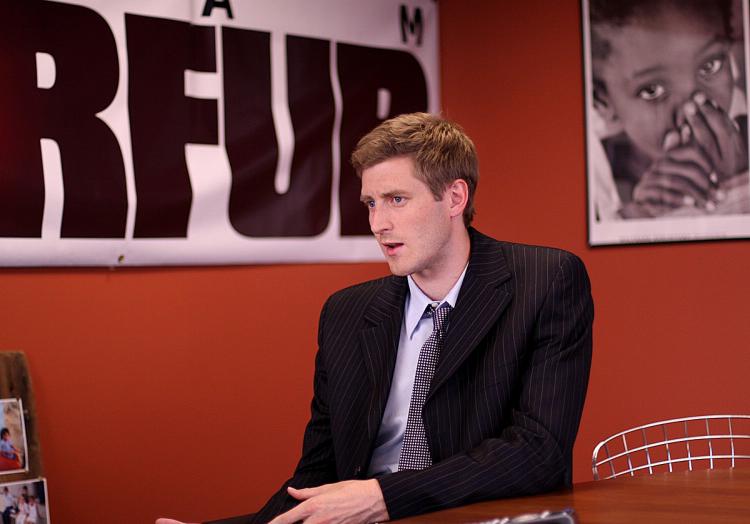“This is a great celebration for them [i.e., Chinese people], I think they deserve it. I just hate to see the fact that the government has been so sweeping and brutal and trying to silence athletes that are not even Chinese, trying to silence athletes from any country.”
Joey Cheek, 29, originally from Greensboro, North Carolina, currently, an undergraduate at Princeton University, majoring in economics and Chinese, is hardly a revolutionary or disruptive type of individual. In fact, his career shows a young man of enormous idealism. Cheek won the Bronze medal in 2002 in Salt Lake City for the 1000 meter. In Turin, he won the silver and gold for the 1000meter and 500 meter, respectively. Then at the age of 26, he took the unusual step and donated his Olympic bonuses of $40,000 to the charity, Right to Play, which helps refugees. He specified the children of Darfur. At his behest, other Olympians and sponsors followed his example, and more than a million dollars was raised.
Why did he do it? He says:
“Coming into the 2006 Olympics, a number of years into these Games, I noticed in ’06, there was enormous coverage of ridiculous, useless things in the United States and very little coverage of some other issues that I had been seeing as I was traveling in Asia … the issue of Darfur was coming up as I was traveling … the scale of the people killed and suffering in Darfur compared with the coverage, there was such a discrepancy there, I felt this was an area I could have a real impact and as I learned more, I felt more compassionate about it.”
Cheek said that his generosity was regarded “as an example of the Olympic spirit.” But the praise began to shift a bit, he says, “When I said, ‘Giving aid to kids is important and incredible but maybe we should—you know—their government should stop shooting them. That will help them quite a lot as well’ … Why are these kids in the refugee camps to begin with?”
So, he founded, with 2004 Bronze medalist, UCLA water polo player, Bradley Greimer, the advocacy organization by international and professional athletes, called Team Darfur, which uses the prestige of Olympian and professional athletes to bring about humanitarian changes in Sudan.
Incidentally, Greimer also had his visa revoked within minutes of Cheek’s. Cheek had acquired a visa around July 1, and was a bit surprised when it was revoked within hours of his departure time. Another member of Team Darfur, 2004 bronze medalist Kendra Zanotto, had her visa denied a month earlier. She was coming as a journalist to cover the Olympics.
Chinese Pressure on Vulnerable Countries
Cheek said he was not plotting to be disruptive, but rather to support some 72 athletes who are Team Darfur members. Secondly, he said, he intended to speak at various forums that he was invited to speak at, and to meet with various United Nations bodies and IOC members.
“We heard a story that national Olympic committees were approached by Chinese officials and told that their athletes who were members of Team Darfur and treated as ‘suspect’ individuals.”
They would be subject to “extra screenings or whatever,” said Cheek. The implication was that they might be denied entry, and so Cheek has been supporting them quietly disassociating themselves from Team Darfur. In the U.S., they apparently went after the leaders–Cheek and Greimer, who are ex-Olympians. It would have been “outrageous” to threaten Team Darfur US Olympic members. They wouldn’t dare do that but instead went after the non-participant U.S. leaders and picked on the weaker countries.
One conspicuous member of Team Darfur who should make the kind of impression that embarrasses Beijing is Lopez Lomong. He was chosen by the U.S. Olympic captains to be the flag carrier this time, an honor that Cheek once held. Born in Sudan and at one time a Sudanese refugee, the 23-year-old 1500 meter runner, who has been an American citizen for just 13 months, will be leading the American team into the 90,000 seat Bird’s Nest Stadium.
Cheek was asked, why criticize China when they are not doing the actual shooting of the children that he champions.
“China is Sudan’s largest trading partner … China right now does massive amount of business in Sudan, purchases two-thirds of Sudan’s oil exports, and invested $10 billion in the last 10 years. They have more leverage of the Sudanese government than any other nation. Their ties cannot be denied … And as host of the Olympics, you make solemn commitments.”
Team Dafur is by no means ‘radical.’ Unlike many other groups advocating improvements in human rights in Dafur, Cheek is quick to point out that Team Darfur supports the Beijing Olympics and never called for a boycott. But China’s behavior abroad in Sudan is regarded by Cheek as running roughshod over the basic concept of the Olympic Games, and misunderstands the opportunity and obligation China has to bring about peace in Darfur during the Olympic interlude.
“The fact is they said at the inception of the Games, when they received the bid, it was a great day for China and the world; when they introduced the [United Nations] resolution last year, [they said that] we hope the Games would be a new means for the world to come together, to speak out on conflict resolution—generally called for in the Assembly resolution for the UN.”
The resolution that China initiated spoke of an Olympic truce worldwide and didn’t specify Sudan. And it was “non-binding,” said Cheek. But such a truce is not without precedent, said Cheek. In 1994, when Norway hosted the winter Olympics, the International Olympic Committee working with the UN brokered a ceasefire, whereby 10,000 Bosnian children were inoculated in about a day, said Cheek.
Moreover, that same year, the Sudanese National Olympic Committee was able to broker a ceasefire between the warring factions in Sudan. So, Cheek notes that there was even a precedent for China this time around in the troubled region of Sudan itself.
“When you look at the Olympic Charter, it speaks over and over again, about more than a sporting event, but a great celebration of humanity, of peace, of being able to come together not on the field of battle.”
Basically China doesn’t care about the Olympic spirit and only about its image, according to Cheek. He says: “To say we going to have this thing and we just will ignore any bad thing that we have influence over—‘Yes, we are doing this great thing for peace, but we are going to ignore all other instances where we completely abandon that pursuit’—I think that is disingenuous.”
What rankles the Olympian the most is the infringement on free speech which Cheek regards as “fundamental” and where he draws the line on what he can tolerate.
“Originally, when not in Olympic venues, you could wear anything you want. Now that is off the table.” Well, he says, “We wouldn’t push it.”
But the Chinese regime wouldn’t stop there and the IOC wouldn’t stand up to them.
“If you go back to follow from the trail of promises from the inception of China getting the Games, every single month as it got closer, [you see] more and more roll back on the promises that were made. The standards get lower and lower. [At first] you “can say whatever you want at press conferences and wear whatever you want.” [Now] ‘No, not allowed to wear anything anywhere… Not allowed to offend the host, not a political event … No, not allowed to speak, you will ruin the Olympics’”
“’No, not allowed to speak on anything and if you do, you are being political.’ And so what we are seeing is a systematic rollback of freedom of speech.”
The White House was not pleased with China’s revoking Gold medalist Cheek’s visa.
“We were disturbed to learn that the Chinese had refused his visa. We are taking the matter very seriously,” said Dana Perino, the presidential press secretary. From the U.S. embassy in Beijing, a démarche was sent to the Chinese, requesting a reconsideration of Cheek’s travel status. Cheek sent an e-mail to the State Department, asking for their intercession and a fax to the Chinese Embassy.





